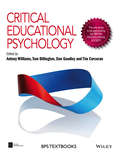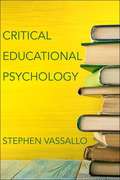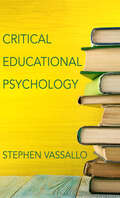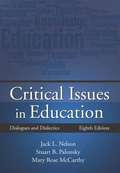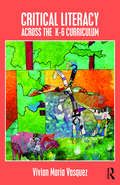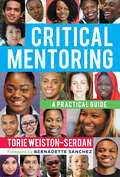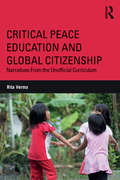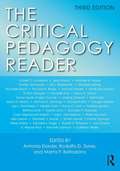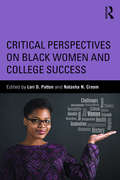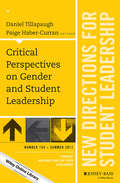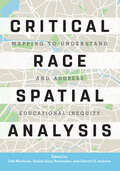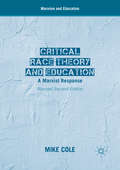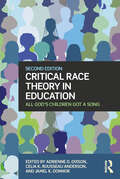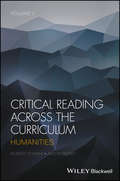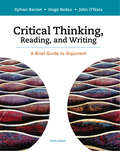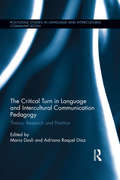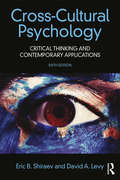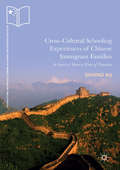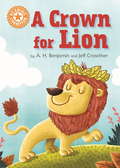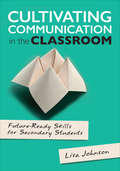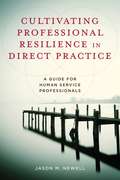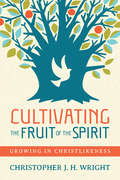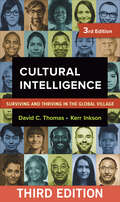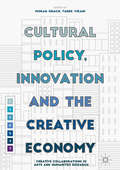- Table View
- List View
Critical Educational Psychology
by Dan Goodley Tim Corcoran Tom Billington Antony J. WilliamsThe first textbook of its kind, Critical Educational Psychology is a forward-thinking approach to educational psychology that uses critical perspectives to challenge current ways of thinking and improve practice.
Critical Educational Psychology: An Examination of Foundational Features of the Field
by Stephen VassalloThe field of critical studies recognizes that all knowledge is deeply embedded in ideological, cultural, political, and historical contexts. Although this approach is commonly applied in other subfields of psychology, educational psychology--which is the study of human learning, thinking, and behavior in formal and informal educational contexts--has resisted a comprehensive critical appraisal. In Critical Educational Psychology, Stephen Vassallo seeks to correct this deficit by demonstrating how the psychology of learning is neither neutral nor value-free but rather bound by a host of contextual issues and assumptions. Vassallo invites teachers and teacher educators, educational researchers, and educational psychologists to think broadly about the implications that their use of psychology has on the teaching and learning process. He applies a wide variety of interdisciplinary approaches to examine the psychology of learning, cognitive development, motivation, creativity, discipline, and attention. Drawing on multiple perspectives within psychology and critical theory, he reveals that contemporary educational psychology is entangled in and underpinned by specific political, ideological, historical, and cultural contexts. A valuable resource for anyone who relies on psychology to interact with, assess, and deliberate over others, especially school-aged children, Critical Educational Psychology resists neatly packaged theories, models, and perspectives that are intended to bring some basis and certainty to pedagogical decision-making. This book will enhance teachers' ethical decision-making and start important new conversations about power and opportunity.
Critical Educational Psychology: An Application Of Critical Educational Psychology (Educational Psychology Ser. #15)
by Stephen VassalloIntroducing students and scholars to the emerging field of critical educational psychology.The field of critical studies recognizes that all knowledge is deeply embedded in ideological, cultural, political, and historical contexts. Although this approach is commonly applied in other subfields of psychology, educational psychology—which is the study of human learning, thinking, and behavior in formal and informal educational contexts—has resisted a comprehensive critical appraisal. In Critical Educational Psychology, Stephen Vassallo seeks to correct this deficit by demonstrating how the psychology of learning is neither neutral nor value-free but rather bound by a host of contextual issues and assumptions. Vassallo invites teachers and teacher educators, educational researchers, and educational psychologists to think broadly about the implications that their use of psychology has on the teaching and learning process. He applies a wide variety of interdisciplinary approaches to examine the psychology of learning, cognitive development, motivation, creativity, discipline, and attention. Drawing on multiple perspectives within psychology and critical theory, he reveals that contemporary educational psychology is entangled in and underpinned by specific political, ideological, historical, and cultural contexts.A valuable resource for anyone who relies on psychology to interact with, assess, and deliberate over others, especially school-aged children, Critical Educational Psychology resists neatly packaged theories, models, and perspectives that are intended to bring some basis and certainty to pedagogical decision-making. This book will enhance teachers’ ethical decision-making and start important new conversations about power and opportunity.
Critical Issues in Education: Dialogues and Dialectics, Eighth Edition
by Jack L. Nelson Stuart B. Palonsky Mary Rose McCarthyFew subjects engender more strongly held beliefs and contrary views than education. The outcomes of debates over education and educational reform impact all citizens. Media coverage of these controversies is sometimes shallow and one-sided, fostering the need to develop critical thinking skills. These skills in turn open opportunities for personal growth, joining the public debate, and helping others participate in critical discussions. <P><P>The authors of Critical Issues in Education present two opposing positions for each of sixteen different hot-button issues, including multiculturalism, school finance, charter schools, teacher evaluation, cyberbullying, and gender equity. Prospective teachers will find the authors' approach eye-opening and stimulating. Ideally, they will teach these valuable skills to their students, who will prosper academically and personally from understanding and considering diverse viewpoints.
Critical Literacy Across the K-6 Curriculum
by Vivian Maria VasquezThrough stories from kindergarten to sixth grade classrooms where students and teachers have attempted to put a critical edge on their teaching, this book shows critical literacy in action across the curriculum. Readers see students and teachers together using critical literacy discourse to frame conversations in ways that engage students in examining the meaning of the texts they read and acting on local and global social issues that emerge. Drawing on multiple perspectives such as cross-curricular explorations, multimedia, and child-centered inquiry pedagogies, the text features a theoretical toolkit; demonstrations from across the content areas including art, music, and media literacy; integration of technology; and attention to how critical literacy can inform decisions about standards and assessment. Annotated booklists, examples of students’ work, Reflection Questions, Try This (practical classroom strategies), and Resource Boxes can be used to encourage and support engaging in critical literacy work in different areas of the curriculum.
Critical Mentoring: A Practical Guide
by Torie Weiston-SerdanThis book introduces the concept of critical mentoring, presenting its theoretical and empirical foundations, and providing telling examples of what it looks like in practice, and what it can achieve. At this juncture when the demographics of our schools and colleges are rapidly changing, critical mentoring provides mentors with a new and essential transformational practice that challenges deficit-based notions of protégés, questions their forced adaptation to dominant ideology, counters the marginalization and minoritization of young people of color, and endows them with voice, power and choice to achieve in society while validating their culture and values.Critical mentoring places youth at the center of the process, challenging norms of adult and institutional authority and notions of saviorism to create collaborative partnerships with youth and communities that recognize there are multiple sources of expertise and knowledge. Torie Weiston-Serdan outlines the underlying foundations of critical race theory, cultural competence and intersectionality, describes how collaborative mentoring works in practice in terms of dispositions and structures, and addresses the implications of rethinking about the purposes and delivery of mentoring services, both for mentors themselves and the organizations for which they work. Each chapter ends with a set of salient questions to ask and key actions to take. These are meant to move the reader from thought to action and provide a basis for discussion.This book offers strategies that are immediately applicable and will create a process that is participatory, emancipatory and transformative.
Critical Peace Education and Global Citizenship: Narratives From the Unofficial Curriculum (Critical Social Thought)
by Rita VermaCritical Peace Education and Global Citizenship offers narrative accounts representing multiple ways teacher and learner activists have come to realize possibilities for peace and reconciliation through unofficial curricula. With these narratives, the book demonstrates the connections between critical peace education and such crucial issues as human trafficking, gang violence, contested narratives of nationhood and belonging, gender identities, and the significance of mentoring. Through rich examples of pedagogic work, this volume enhances and illustrates critically oriented understandings and interpretations of peace in real classrooms with diverse populations of students. Written primarily for scholars and graduate students working in the fields of educational theory, critical pedagogy, and educational policy, the chapters in this book tell a compelling story about teachers, learners and scholar activists who continue to struggle for the creation of transformative and meaningful sites for peace praxis.
The Critical Pedagogy Reader (Third Edition)
by Antonia Darder Rodolfo D. Torres Marta P. BaltodanoFor fifteen years, The Critical Pedagogy Reader has established itself as the leading collection of classic and contemporary essays by the major thinkers in the field of critical pedagogy. While retaining its comprehensive introduction, this thoroughly revised third edition includes updated section introductions, expanded bibliographies, and up-to-date classroom questions. The book is arranged topically around issues such as class, racism, gender/sexuality, critical literacies, and classroom issues, for ease of usage and navigation. New to this edition are substantive updates to the selections of contemporary readings, including pieces that reflect issues such as immigrant and refugee students, the role of social justice in teacher education, and an emphasis on practical elements of pedagogy, as well as it significance to forging democratic life. Carefully attentive to theory and practice, this much-anticipated third edition remains the definitive, foundational source for teaching and learning about critical pedagogy.
Critical Perspectives on Black Women and College Success
by Lori D. Patton Natasha N. CroomIn this comprehensive volume, research-based chapters examine the experiences that have shaped college life for Black undergraduate women, and invite readers to grapple with the current myths and definitions that are shaping the discourses surrounding them.? Chapter authors ask valuable questions that are critical for advancing the participation and success of Black women in higher education settings and also provide actionable recommendations to enhance their educational success.? Perspectives about Black undergraduate women from various facets of the higher education spectrum are included, sharing their experiences in academic and social settings, issues of identity, intersectionality, and the services and support systems that contribute to their success in college, and beyond.? Presenting comprehensive, theoretically grounded, and thought-provoking scholarship, Critical Perspectives on Black Women and College Success is a definitive resource for scholarship and research on Black undergraduate women.
Critical Perspectives on Gender and Student Leadership: New Directions for Student Leadership, Number 154 (J-B SL Single Issue Student Leadership)
by Daniel Tillapaugh Paige Haber-CurranHow do students’ social identities, particularly their gender, influence their leadership practices and development? Using Kimberlé Crenshaw’s concept of intersectionality as a framework, this volume discusses existing and emergent research on gender and leadership and offers key strategies and on how leadership educators can engage students in these topics and provide contemporary critical thinking on how gender and leadership inform one another.This volume examines: the ways intersectionality can be used as a lens for gender and leadership, key considerations for developing and advancing leadership among women, men, and trans* students, programs and experiences grounded in critical self-reflection and leadership learning among students of all genders, and opportunities for leadership educators to navigate topics of gender and leadership, emphasizing their own self-work and avenues for affecting positive change. Contributing scholars share examples that are developmentally appropriate for high school and college students. This work is designed with leadership educators in mind, emphasizing theory into practice and highlighting the ways that leadership and gender can promote holistic, transformative learning for all students.The Jossey-Bass quarterly report series New Directions for Student Leadership explores leadership concepts and pedagogical topics of interest to high school and college leadership educators. Issues are grounded in scholarship and feature practical applications and best practices in youth and adult leadership education.
Critical Race Spatial Analysis: Mapping to Understand and Address Educational Inequity
by Deb Morrison Subini Ancy Annamma Darrell D. JacksonHow does space illuminate educational inequity?Where and how can spatial analysis be used to disrupt educational inequity?Which tools are most appropriate for the spatial analysis of educational equity?This book addresses these questions and explores the use of critical spatial analysis to uncover the dimensions of entrenched and systemic racial inequities in educational settings and identify ways to redress them. The contributors to this book – some of whom are pioneering scholars of critical race spatial analysis theory and methodology – demonstrate the application of the theory and tools applied to specific locales, and in doing so illustrate how this spatial and temporal lens enriches traditional approaches to research. The opening macro-theoretical chapter lays the foundation for the book, rooting spatial analyses in critical commitments to studying injustice. Among the innovative methodological chapters included in this book is the re-conceptualization of mapping and space beyond the simple exploration of external spaces to considering internal geographies, highlighting how the privileged may differ in socio-spatial thinking from oppressed communities and what may be learned from both perspectives; data representations that allow the construction of varied narratives based on differences in positionality and historicity of perspectives; the application of redlining to the analysis of classroom interactions; the use of historical archives to uncover the process of marginalization; and the application of techniques such as the fotonovela and GIS to identify how spaces are defined and can be reimagined.The book demonstrates the analytical and communicative power of mapping and its potential for identifying and dismantling racial injustice in education. The editors conclude by drawing connections across sections, and elucidating the tensions and possibilities for future research.ContributorsBenjamin BlaisdellGraham S. GarlickLeigh Anna HidalgoMark C. HogrebeJoshua RadinskyDaniel G. SolórzanoWilliam F. TateVerónica N. VélezFederico R. Waitoller
Critical Race Theory and Education: A Marxist Response (Marxism and Education)
by Mike ColeThis book, now in its second edition, focuses on the challenge to Marxism posed by Critical Race Theory as this relates to educational theory, policy, and practices with respect to both the US and UK. Critical Race Theory (CRT) in the realm of Education has a long history in the US, and is now a burgeoning field of inquiry in the UK. Critical Race Theory and Education is the first book-length response to CRT from a Marxist perspective and looks at CRT's origins in Critical Legal Studies, critiques the work of major US and UK Critical Race theorists, and also looks at some of CRT's strengths. CRT and Marxism are contextualized with respect to both neo-liberal global capitalism and imperialism and to anti-racist socialist developments in South America. The book concludes with some suggestions for classroom practice.
Critical Race Theory in Education: All God's Children Got a Song
by Adrienne D. Dixson, Celia K. Rousseau Anderson, and Jamel K. DonnorAppropriate for both students curious about Critical Race Theory (CRT) and established scholars, Critical Race Theory in Education is a valuable guide to how this theoretical lens can help better understand and seek solutions to educational inequity. While CRT has been established as a vital theoretical framework for understanding the ways race-neutral policies and laws sustain and promote racial inequity, questions around how to engage and use CRT remain. This second edition of Critical Race Theory in Education evaluates the role of CRT in the field of higher education, answering important questions about how we should understand and account for racial disparities in our school systems. Parts I and II trace the roots of CRT from the legal scholarship in which it originated to the educational discourse in which it now resides. A much-anticipated Part III examines contemporary issues in racial discourse and offers all-important practical methods for adopting CRT in the classroom.
Critical Reading Across the Curriculum: Humanities
by Robert DiYanni Anton BorstPowerful strategies, tools, and techniques for educators teaching students critical reading skills in the humanities. Every educator understands the importance of teaching students how to read critically. Even the best teachers, however, find it challenging to translate their own learned critical reading practices into explicit strategies for their students. Critical Reading Across the Curriculum: Humanities, Volume 1 presents exceptional insight into what educators require to facilitate critical and creative thinking skills. Written by scholar-educators from across the humanities, each of the thirteen essays in this volume describes strategies educators have successfully executed to develop critical reading skills in students studying the humanities. These include ways to help students: focus actively re-read and reflect, to re-think, and re-consider understand the close relationship between reading and writing become cognizant of the critical importance of context in critical reading and of making contextual connections learn to ask the right questions in critical reading and reasoning appreciate reading as dialogue, debate, and engaged conversation In addition, teachers will find an abundance of innovative exercises and activities encouraging students to practice their critical reading skills. These can easily be adapted for and applied across many disciplines and course curricula in the humanities. The lifelong benefits of strong critical reading skills are undeniable. Students with properly developed critical reading skills are confident learners with an enriched understanding of the world around them. They advance academically and are prepared for college success. This book arms educators (librarians, high school teachers, university lecturers, and beyond) with the tools to teach a most paramount lesson.
Critical Thinking, Reading, and Writing
by Sylvan Barnet Hugo Bedau John O’haraCritical Thinking, Reading, and Writing is a compact but complete guide to critical thinking and argumentation. Comprising the text portion of the widely adopted Current Issues and Enduring Questions, it draws on the authors’ dual expertise in effective persuasive writing and comprehensive rhetorical strategies to help students move from critical thinking to argumentative and researched writing. This extraordinarily versatile text includes comprehensive coverage of classic and contemporary approaches to argument, from Aristotelian to Toulmin, to a new chapter on rhetorical analysis of pop culture texts, as well as 35 readings (including e-Pages that allow students to take advantage of working with multimodal arguments on the Web), and a casebook on the state and the individual. This affordable guide can stand alone or supplement a larger anthology of readings.
The Critical Turn in Language and Intercultural Communication Pedagogy: Theory, Research and Practice (Routledge Studies in Language and Intercultural Communication)
by Maria Dasli Adriana Raquel DíazThis edited research volume explores the development of what can be described as the ‘critical turn’ in intercultural communication pedagogy, with a particular focus on modern/foreign language education. The main aim is to trace the realisations of this critical turn against a background of unequal power relations, and to illuminate the role that radical culture educators can play in the making of a more democratic and egalitarian social order. The volume takes as a starting point the idea that criticality draws on a number of intellectual traditions, which do not always focus on social and political critique, and argues that because ideological hegemony impacts on the meanings that people create and share, intercultural communication pedagogy ought to locate itself within wider socio-political contexts. With reference points drawn from critical and transnational social theory, critical pedagogy and intercultural theory, contributors to this volume provide readers with powerful ways that show how this can be achieved, and together assess the impact that their understanding of criticality can make on modern/foreign language education. The volume is divided into three major parts, namely: ‘theorising critically’, ‘researching critically’ and ‘teaching critically’.
Cross-Cultural Psychology: Critical Thinking and Contemporary Applications (6th Edition)
by Eric B. Shiraev David A. Levy<p>Written in a conversational style that transforms complex ideas into accessible ones, this international best-seller provides an interdisciplinary review of the theories and research in cross‐cultural psychology. The book’s unique critical thinking framework, including Critical Thinking boxes, helps to develop analytical skills. Exercises interspersed throughout promote active learning and encourage class discussion. Case in Point sections review controversial issues and opinions about behavior in different cultural contexts. Cross‐Cultural Sensitivity boxes underscore the importance of empathy in communication. Numerous applications better prepare students for working in various multicultural contexts such as teaching, counseling, health care, and social work. The dynamic author team brings a diverse set of experiences in writing this book. Eric Shiraev was raised in the former Soviet Union and David Levy is from Southern California. Sensation, perception, consciousness, intelligence, human development, emotion, motivation, social perception, interaction, psychological disorders, and applied topics are explored from cross‐cultural perspectives. New to the 6th Edition: <p> <li>Over 200 recent references, particularly on studies of non-western regions such as the Middle East, Africa, Asia, & Latin America as well as the US and Europe. <li>New chapter on personality and the self with an emphasis on gender identity. <li>New or revised chapter opening vignettes that draw upon current events. <li>More examples related to the experiences of international students in the US and indigenous people. <li>Many more figures and tables that appeal to visual learners. <li>New research on gender, race, religious beliefs, parenting styles, sexual orientation, ethnic identity and stereotypes, conflict resolution, immigration, intelligence, physical abuse, states of consciousness, DSM-5, cultural customs, evolutionary psychology, treatment of psychological disorders, and acculturation. <li>Revised methodology chapter with more attention to issues related specifically to cross-cultural research and more on qualitative and mixed methods. <li>A companion website at www.routledge.com/9781138668386 where instructors will find a test bank containing multiple choice, true and false, short answer, and essay questions and answers for each chapter, and a complete set of tables and figures from the text; and students will find chapter outlines, flashcards of key terms, and links to further resources and the authors' Facebook page.</li> <p> <p>Intended as a text for courses on cross-cultural psychology, multicultural psychology, cultural psychology, cultural diversity, and the psychology of ethnic groups and a resource for practitioners, researchers, and educators who work in multicultural environments.</p>
Cross-Cultural Schooling Experiences of Chinese Immigrant Families: In Search of Home in Times of Transition (Intercultural Reciprocal Learning in Chinese and Western Education)
by Shijing XuThis book introduces the concept of reciprocal educational learning among cultures with very different historical and philosophical origins. The concept of reciprocal learning grows out of a four year study of immigrant Chinese family narrative experiences in a Western context. This book captures the lived moments of such transitional lives both in and out of school settings to demonstrate why a child would appear and disappear from different caregivers' purview. Through the narrative lens of student and family life, the study illustrates the intersection of Confucian and Western philosophies of education and how their interaction creates complications as well as benefits for both traditions, hence, the idea of reciprocal learning.
A Crown for Lion: Independent Reading Orange 6 (Reading Champion #128)
by A.H. BenjaminIn this fun, animal story, Lion is looking for a crown - he wants everyone to know he is the king. The animals try many different things, but nothing seems to work... until Lion has a sneezing fit!Reading Champion offers independent reading books for children to practise and reinforce their developing reading skills.Fantastic, original stories are accompanied by engaging artwork and a reading activity. Each book has been carefully graded so that it can be matched to a child's reading ability, encouraging reading for pleasure.Independent Reading: Orange stories are perfect for children aged 5+ who are reading at book band 6 (Orange) in classroom reading lessons.
Cultivating Communication in the Classroom: Future-Ready Skills for Secondary Students (Corwin Teaching Essentials)
by Lisa Ann JohnsonBuilding 21st Century communication skills Students are expected to be innovators, creative thinkers, and problem solvers. But what if they can't communicate their ideas persuasively? Knowing how to share ideas is as crucial as the ideas themselves. Unfortunately, many students don’t get explicit opportunities to hone this skill. Cultivating Communication in the Classroom will help educators design authentic learning experiences that allow students to practice their skills. Readers will find: Real world insights into how students will be expected to communicate in their future careers and education Strategies for teaching communication skills throughout the curriculum Communication Catchers for igniting ideas
Cultivating Communication in the Classroom: Future-Ready Skills for Secondary Students (Corwin Teaching Essentials)
by Lisa Ann JohnsonBuilding 21st Century communication skills Students are expected to be innovators, creative thinkers, and problem solvers. But what if they can't communicate their ideas persuasively? Knowing how to share ideas is as crucial as the ideas themselves. Unfortunately, many students don’t get explicit opportunities to hone this skill. Cultivating Communication in the Classroom will help educators design authentic learning experiences that allow students to practice their skills. Readers will find: Real world insights into how students will be expected to communicate in their future careers and education Strategies for teaching communication skills throughout the curriculum Communication Catchers for igniting ideas
Cultivating Professional Resilience in Direct Practice: A Guide for Human Service Professionals
by Jason M. NewellOverwhelming empirical evidence indicates that new social workers, particularly those going into child welfare or other trauma-related care, will discover emotional challenges including the indirect or secondary effects of the trauma work itself, professional burnout, and compassion fatigue. However, the newly revised CSWE Educational Policy and Accreditation Standards (EPAS) does not mandate the inclusion of content related to self-care in social work curriculum or field education. In a textbook that bridges the gap between theoretical and pragmatic approaches to this important issue in human service work, Jason M. Newell provides a potential resolution by conceptualizing self-care as an ongoing and holistic set of practice behaviors described as the key to professional resilience.To address the effects of trauma-related care on direct practitioners, Newell provides a comprehensive, competency-based model for professional resilience, examining four key constructs—stress, empathy, resilience, and self-care—from a range of theoretical dimensions. For those who work with vulnerable populations, the tendency to frame self-care solely within organizational context overlooks the importance of self-care in domains beyond the agency setting. Alternatively, he uses a framework grounded in the ecological-systems perspective conceptualizing self-care as a broader set of practice behaviors pertaining to the whole person, including the physical, interpersonal, organizational, familial, and spiritual domains of the psychosocial self. Alongside professional self-care practices at the organizational level, Newell makes a case for the pragmatic role of recreational activities, time with family and friends, physical health, spirituality, and mindfulness. The application of a comprehensive approach to self-care practice has potential to empower practitioners to remain resilient and committed to the values, mission, and spirit of the social work profession in the face of trauma.
Cultivating the Fruit of the Spirit: Growing in Christlikeness
by Christopher J. H. WrightHow should Christians live? On the one hand, some very legalistic Christians stress the importance of keeping all the rules—that you must do this and never do that if you want to prove you are really a Christian. On the other hand, there are those who reject the whole idea of rules or traditions in the church and see the point of the Christian faith as setting us free from the institutionalized religious burden. But Paul addresses these two competing views by showing us a far better way—a truly Christian way to live our lives. It is the way of the Spirit of God given to us through Christ: "Walk by the Spirit . . . led by the Spirit . . . live by the Spirit . . . keep in step with the Spirit." That is the heart and soul of Christian living. It is the center and secret of what it means to be a person who belongs to Christ. Pastor and scholar Christopher Wright invites us to live a life in step with the Spirit by cultivating the fruit of the Spirit: love, joy, peace, patience, kindness, goodness, faithfulness, gentleness, and self-control. These nine chapters, each addressing a different fruit, each conclude with questions for contemplation or discussion. Feed on the Word of God, grow in Christlikeness, and live a fruitful life.
Cultural Intelligence: Surviving and Thriving in the Global Village
by David C. Thomas Kerr C. InksonSucceed in Any Culture, in Every Situation In today's global economy, the ability to interact effectively across cultures is a fundamental job requirement for just about everyone. But it's impossible to learn the customs and traits of every single culture. David Thomas and Kerr Inkson present a universal set of techniques and people skills that will allow you to adapt quickly to, and thrive in, any cultural environment. You'll learn to discard your own culturally based assumptions and pay careful attention, in a mindful and creative way, to cues in cross-cultural situations. The authors show how to apply cultural intelligence in a series of specific situations: making decisions; communicating, negotiating, and resolving conflicts; leading and motivating others; and designing, managing, and contributing to multicultural groups and teams. This extensively revised third edition has been updated with new stories showing cultural intelligence in action. Thomas and Inkson have broadened the focus beyond business to include organizations of all kinds—nonprofits, governments, educational institutions, and more. And they include a reliable and valid measure of cultural intelligence based on a decade of research by an international team of scholars.
Cultural Policy, Innovation and the Creative Economy: Creative Collaborations in Arts and Humanities Research
by Morag Shiach Tarek ViraniThis book develops important new insights into the conditions that enable effective collaborations between arts and humanities researchers and SMEs in the creative economy. Drawing on the work of Creativeworks London, an AHRC-funded Knowledge Exchange Hub for the Creative Economy, this is an in-depth study of how co-created and collaborative research projects work on the ground and will be of immense value to all these audiences. Chapters by researchers and practitioners examine a range of collaborative research projects supported by Creativeworks London's vouchers, which cover a large number of creative industry sectors and academic disciplines. The book identifies key learning from these projects that has wider relevance for academics, funders, policy makers, and SMEs in the creative economy. Morag Shiach is Professor of Cultural history at Queen Mary University of London, UK, where she is also Director of Creativeworks London and Vice-Principal for Humanities and Social Sciences. Her publications include Modernism, Labour and Selfhood in British Literature and Culture; Feminism and Cultural Studies; Hélène Cixous: A Politics of Writing; and Discourse on Popular Culture. Dr. Virani obtained his PhD from King's College London, UK. He is a full time researcher for Creativeworks London research project at Queen Mary University of London, UK. His research interests include the role of knowledge in the cultural economy, artistic knowledge within locally bounded artistic communities, and new work spaces in the creative and cultural economy.
